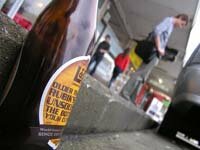22 November 2008
Bottle banks too costly, says Kiwis
31 August 2007
By Eloise Gibson: Te Waha Nui Online
 |
New Zealanders would go back to 1970s-style bottle banks but they don’t want to pay for the privilege, a new survey shows.
A poll of 1387 people from around the country asked whether a recycling deposit should be added to the price of drinks.
The deposit would be added at the point of purchase and paid back when the empty container was returned to a collection point, suggested the survey.
When first asked, most people either supported the idea of a deposit or were neutral.
But when asked how much they would pay, 60 per cent of respondents wanted to pay either nothing or 5c – too little to make a deposit system work.
The ShapeNZ poll was released last month by the Business Council for Sustainable Development, whose members include Coca-Cola Amatil and Huhtamaki Flexible Packaging.
Back in the days
New Zealand had a successful container deposit system in the 1970s and 80s, when the beverage
industry used bottle banks to ensure bottles were returned to be washed, refilled and sold.
The scheme died out when manufacturers started using more disposable containers.
Business council chief executive Peter Neilson says bottle banks would not work as well today.
“There was no kerbside recycling in those days.
“Now people are already paying for kerbside recycling, and it works, so they aren’t prepared to pay much more.”
Researcher Julie Dickinson, who has written a report on container deposit systems for local authorities, says the schemes have been very effective at reducing litter in South Australia and Canada.
She says the financial incentive makes people more likely to recycle.
“We’re very basic creatures. If you see 5c or 10c lying there in the gutter, you don’t have to be very civic-minded to pick it up.”
Dickinson says a deposit scheme puts the cost of dealing with packaging back on to producers and consumers. “The cost of beverage container recycling has been popped on to the ratepayer, and of course the industry doesn’t want to change this.”
The numbers
New Zealanders buy more than 670,000 tonnes of packaging every year, and recycle about half of it.
But countries with successful container deposit schemes recycle 80 or 90 per cent of packaging.
Eleven states in the United States, most Canadian provinces, many European countries and one state in Australia have compulsory container deposit schemes.
The Packaging Council, whose members include Coca-Cola Amatil, Huhtamaki Flexible Packaging, McDonalds and Frucor, says 95 per cent of New Zealanders already have access to recycling facilities and the scheme would just divert packaging from kerbside collection.
Executive director Paul Curtis, says it’s more efficient for local councils to collect and recycle packaging.
“It’s a business that’s dependent on volume.”
But Dickinson says kerbside recycling only catches beverages drunk at home.
“Fifty per cent of beverages are drunk away from home. The rest is in town, at the beach, in the car. People are chucking them on the road or in the litter bin, so they won’t reach kerbside recycling.”


